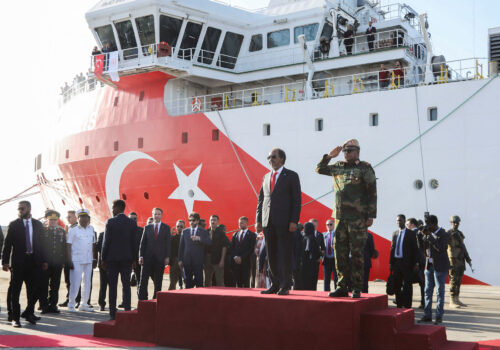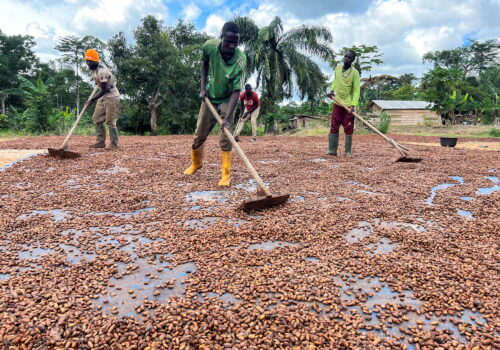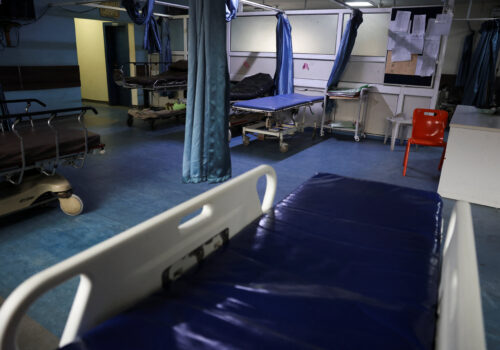“Reforming the global financial architecture” has become a central theme in multilateral discussions.
Today’s global financial architecture was designed in 1944 at the Bretton Woods conference, which looked to rebuild postwar Europe. But there was no African representation there. Today, the global financial system struggles to meet the needs of a continent that is home to 1.5 billion people—nearly a fifth of the world’s population. African countries still face high borrowing costs, debt distress, and limited fiscal space.
But now, policy forums are looking to reform the financial system to ensure that it works for African countries. One such forum is the Group of Twenty (G20) International Financial Architecture Working Group (IFAWG), a technical working group of the G20’s Finance Track, which focuses on monetary, fiscal, and economic issues. I am participating in the group today in my capacity as an advisor at the African Development Bank. Here’s my analysis on the policy discussions we’re having this year in the IFAWG and why they matter for Africa.
Inside IFAWG
IFAWG was established following the 2008 global financial crisis and is mandated to promote stability in the international financial system. Initially focused on issues including capital flow volatility and crisis prevention, its role has since expanded dramatically. Today, the working group is the G20’s central venue for discussions on sovereign debt and debt sustainability, cost of capital, reforms of multilateral development banks (MDBs), and strengthening the global financial safety net.
The group submits its deliverables to the G20 Finance Ministers and Central Bank Governors Meetings, and such deliverables ultimately form part of the negotiated G20 communiqué. That’s why African representation in these working groups is so important. These groups are fora where policies are shaped before receiving endorsement at the ministerial level.
This shaping—of both policy and conversation—has increasingly been conducted by African voices, particularly during South Africa’s G20 presidency this year. South Africa chose “Solidarity, Equality, Sustainability” as the theme of its presidency, and it has set priorities intended to align with the development needs of the African continent and the Global South. Within IFAWG, such priorities include strengthening MDBs, mobilizing development finance, addressing sovereign debt sustainability and liquidity challenges, reforming the global financial safety net, and enhancing capital flows to emerging markets and developing economies.
Strengthening MDBs and unlocking capital
IFAWG is focusing on strengthening MDBs, as implementing reforms will be particularly important for unlocking much-needed capital at scale. But the MDB-reform agenda has already been underway for some time. It began under Italy’s 2021 G20 presidency, when Italy initiated a review of capital adequacy frameworks, which help banks pinpoint the capital needed to support their assets, liabilities, and risks. By conducting the review, the G20 was looking to boost MDB lending capacity to respond to global challenges. The subsequent Indonesian, Indian, and Brazilian G20 presidencies have built on this work, with Brazil’s presidency specifically devising a roadmap for reforms to enable such banks to better address regional and global challenges—and ultimately help countries achieve their development objectives.
IFAWG, under the South African presidency, has focused its MDB work on a monitoring and reporting framework to track the implementation of these recommendations. Africa’s role in shaping this conversation is crucial for designing financial innovations geared toward the continent’s wants and priorities. For example, to boost MDB lending, the African Development Bank and Inter-American Development Bank worked together on a joint proposal to use special drawing rights (or SDRs, global reserve assets maintained by the International Monetary Fund) as hybrid capital. In practice, this proposal would allow advanced economies to channel unused SDRs to the African Development Bank or Inter-American Development Bank, while still counting them as reserves. Subsequently, both banks could then leverage these SDRs to raise more financing on markets, multiplying their impact and providing long-term, low-cost resources for development.
On a broader scale, the G20 at a ministerial level is catching up to the conversations about strengthening MDBs and unlocking capital. This can be seen in G20 support, as expressed in recent communiqués, for the seventeenth replenishment of the African Development Fund—the concessional financing window of the African Development Bank Group, which provides grants and low-interest loans to Africa’s lowest-income countries.
Addressing debt sustainability
IFAWG is paying particular attention to fixing the debt architecture because of the urgency of doing so. African countries, on average, pay a roughly 300-basis-point risk premium on what they borrow from international financial markets, unlike even similarly rated peers. Interest payments alone consume 18 percent of government revenues on average. These are resources diverted from health and education systems, as well as infrastructure projects. Under these circumstances, many African nations find themselves at high risk of debt distress.
The G20’s Common Framework for Debt Treatment, launched under the Saudi Arabian presidency in 2020, was meant to provide a structured and coordinated approach to sovereign debt restructuring for eligible low-income countries. Four African countries—Chad, Zambia, Ghana, and Ethiopia—have entered the framework, each navigating complex restructurings with mixed outcomes. Although the framework received much attention for being bold, its execution has drawn criticism for lack of clarity, predictability, and speed.
In response, IFAWG is working to improve transparency and consistency. African voices have played an active role in pushing for predictability, speed, and transparency. Senior government officials are advocating for faster and more transparent debt-resolution processes, more predictable timelines, a fair participation of all creditors, to name a few issues.
Therefore, Africa is not merely affected by these reforms. It is actively shaping them. The continent is proactively engaging in technical debates and, in so doing, is producing foundational shifts on issues ranging from strengthening multilateral development banks to debt restructuring and reducing the cost of capital. As the G20 Leaders Summit nears, Africa’s voice is no longer on the margins; it is at the heart of global financial reform. IFAWG’s work is proof of that.
Sijh Diagne is an advisor to the vice president of finance and chief financial officer of the African Development Bank Group. He participates as a representative of the African Development Bank at the G20 International Financial Architecture Working Group meetings. He previously served as senior advisor to the minister of economy, planning, and cooperation of Senegal and as G20 deputy representing the African Union during Senegal’s African Union chairmanship in 2022.

The Africa Center works to promote dynamic geopolitical partnerships with African states and to redirect US and European policy priorities toward strengthening security and bolstering economic growth and prosperity on the continent.
Further reading
Wed, Sep 10, 2025
To counter Chinese and Russian influence in Africa, Turkey could be a decisive ally for the US and Europe
AfricaSource By Rama Yade, Defne Arslan
As Turkey continues to develop closer ties to African nations, the United States and Europe should work with Turkey as a partner in its efforts to gain soft power throughout the continent.
Fri, Aug 15, 2025
Cameroon could bridge the gap in US cocoa and timber imports
AfricaSource By
As cocoa prices surge and timber demand grows, Cameroon stands out as a strategic trade partner. US firms and policymakers have yet to fully seize the opportunity.
Thu, Aug 14, 2025
Biased credit ratings are costing Africa billions—and worsening its health crises
AfricaSource By
As debt payments outpace spending on health and education, African leaders are renewing calls to overhaul a credit ratings system they say punishes reform and deepens fragility. Zambia is a case in point.
Image: Photo taken on July 17, 2025, shows the venue of a two-day meeting of Group of 20 finance ministers and central bank governors starting the same day near Durban, South Africa. (Kyodo) ==Kyodo NO USE JAPAN





